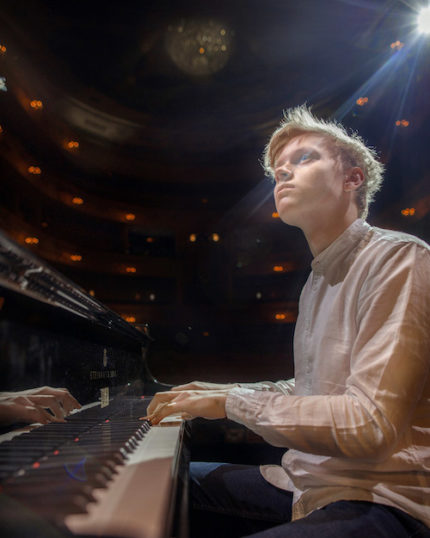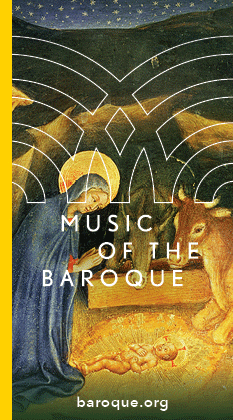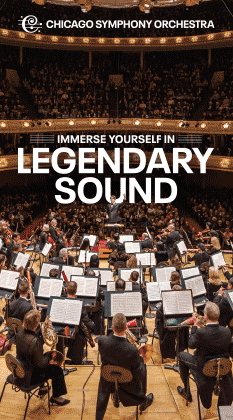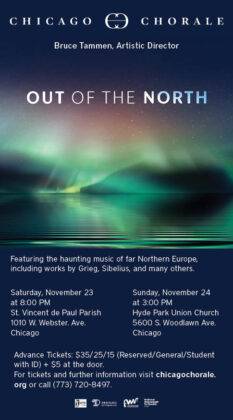Malofeev makes worthy Ravinia debut in over-generous program

Alexander Malofeev had been scheduled to make his Ravinia debut in the summer of 2020, at the age of 18. That season was zeroed out due to the pandemic, and attempts to reschedule for the following summer were stymied also. Thanks to persistence from Ravinia and Malofeev both, the Russian pianist made his first festival appearance Thursday night at the Martin Theater.
Malofeev is a striking figure. With a shock of platinum blond hair and exceptionally boyish looks, he appears even younger than his 20 years. He has a commanding stage presence, however, and Thursday night the pianist was palpably engrossed in his program of post-romantic Russian repertoire. Still, the results proved somewhat erratic.
The evening began with Rachmaninoff’s eight Études-tableaux, Op. 33, four of which were being heard for the first time at Ravinia. It would be hard to imagine a more convincing performance. Malofeev brought out the character of each miniature’s small universe, from the spellbinding No. 1 in F Minor, to the breakneck No. 5 in E-flat Minor, and the final, fulminating Grave (No. 8) in C-sharp Minor. Each was rendered with excellent voicing and close attention to the subtleties of Rachmaninoff’s dense writing.
Medtner’s Piano Sonata No. 5 ensued, and left a more mixed impression. Medtner’s oeuvre inhabits a middle ground between Rachmaninoff’s lush romanticism and Scriabin’s exoticism. His music can feel at times like a generative splitting the difference, but at others more like a no-man’s-land.
The latter impression prevailed in Malofeev’s rendition of the through-composed Sonata No. 5. Though fiery in the agitated Allegro assai portions, it was easy to lose the thread of Malofeev’s performance. While he assertively dispatched the sonata’s technical demands, greater attention to and emphasis of structural moments in the score would have made for a more grounded reading.
Music of Scriabin followed intermission, with the Five Preludes Op. 16 and the Two Impromptus, Op. 12, the latter heard in their Ravinia premiere. These late 19th-century works show Scriabin at his most Chopin-esque—aphoristic vignettes that swiftly capture a mood and then recede. Malofeev found abundant poetry in these short sketches, showing his capabilities in a more intimate mode.
Prokofiev’s Sonata No. 7 closed the billed program. The middle of the so-called “War Trilogy” of piano sonatas, the Seventh is a brutal work. The 1941 score captures the agony and horror of a bombarded Russia, and Prokofiev takes no prisoners in his evocation. The opening theme almost sounded like a shriek in Malofeev’s performance, and he brought enormous force to the menacing portions of the Andante caloroso. For the closing 7/8 Precipitato, Malofeev opted for a more deliberate tempo than some other pianists, which actually enhanced the movement’s insistent, obsessive drive.
Then came the encores—seven, to be precise. These comprised three further Medtner selections (“Canzona Serenata” and “Danza Festiva” from Forgotten Melodies Op. 38, and “Elf Tale” from Op. 48), Balakirev’s Islamey, the Prokofiev Toccata, and two virtuosic Pletnev transcriptions from The Nutcracker (“Pas de Deux” and “Trepak”).
Taken as a whole, the additional, unplanned forty minutes of music amounted to an enormous missed opportunity for the young pianist to show a different side of himself. Instead, he opted to ratchet up increasing levels of bombast, to which he brought progressively less care and attention. There is a motto theme to Islamey, but one could barely discern it in Malofeev’s banged-out rendition. The Trepak, which mercifully closed the evening, was almost unrecognizable amidst a din of interpolated pyrotechnics.
Malofeev could have taken his curtain after two of these and left the audience with a fine impression. Instead, one left with the feeling that this was a young man who has yet to learn that there is such a thing as too much of him for one night.
The Chicago Symphony Orchestra performs works by Debussy, Ravel, Ortiz, Copland, and Moncayo under Carlos Miguel Prieto with pianist Conrad Tao 8 p.m. Friday. www.ravinia.org
Posted in Uncategorized




Posted Aug 24, 2022 at 12:53 am by MM Glaser
Oh, pshaw! Sure us geezers want to get to bed on time, but honestly, if one is ever going to be excessive, when you are twenty, and full of energy, and have been disappointed and cooped up for two years just as you were ready to meet the world—well, that, to me, qualifies as the time to be excessive!
He had a really enthusiastic audience and I think it was fine for him to let his hair down (which was already pretty much let down!) and just play to the crowd! It was a celebration, and I say, go to it, Alexander!